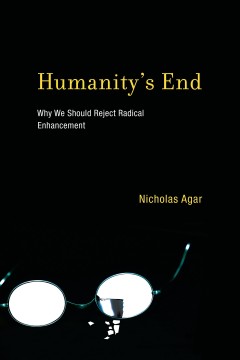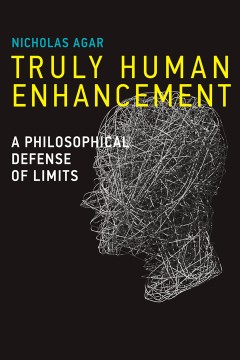Filter by

Humanity's end: Why we should reject radical enhancement
"A Bradford book."""Arguments against radical enhancement have too often in the past been characterized by irrationalism and mysticism. Nicholas Agar presents the first cogent case for the rationality of opposing radical enhancement. Moving easily between science and philosophy, he argues for a species-relative conception of valuable experiences, according to which we have a strong reason to re…
- Edition
- -
- ISBN/ISSN
- 9780262289122
- Collation
- 1 online resource (viii, 219 pages).
- Series Title
- -
- Call Number
- -

Truly human enhancement : a philosophical defense of limits
The transformative potential of genetic and cybernetic technologies to enhance human capabilities is most often either rejected on moral and prudential grounds or hailed as the future salvation of humanity. In this book, Nicholas Agar offers a more nuanced view, making a case for moderate human enhancement -- improvements to attributes and abilities that do not significantly exceed what is curr…
- Edition
- -
- ISBN/ISSN
- 9780262318976
- Collation
- 1 online resource (233 pages) :illustrations.
- Series Title
- -
- Call Number
- -

How to be human in the digital economy
An argument in favor of finding a place for humans (and humanness) in the future digital economy. In the digital economy, accountants, baristas, and cashiers can be automated out of employment; so can surgeons, airline pilots, and cab drivers. Machines will be able to do these jobs more efficiently, accurately, and inexpensively. But, Nicholas Agar warns in this provocative book, these developm…
- Edition
- -
- ISBN/ISSN
- 9780262349154
- Collation
- 1 online resource (232 pages).
- Series Title
- -
- Call Number
- -
 Computer Science, Information & General Works
Computer Science, Information & General Works  Philosophy & Psychology
Philosophy & Psychology  Religion
Religion  Social Sciences
Social Sciences  Language
Language  Pure Science
Pure Science  Applied Sciences
Applied Sciences  Art & Recreation
Art & Recreation  Literature
Literature  History & Geography
History & Geography